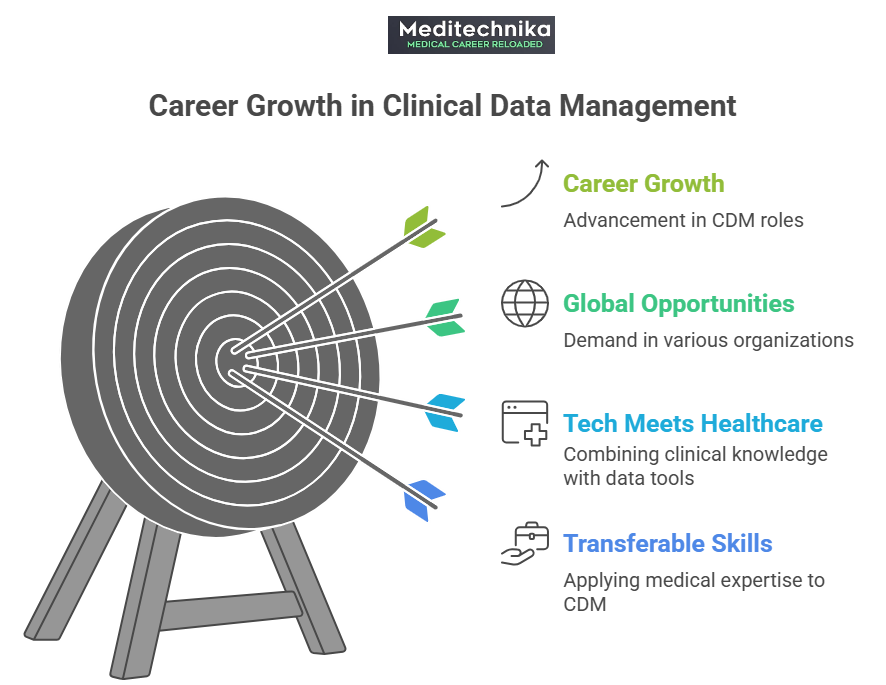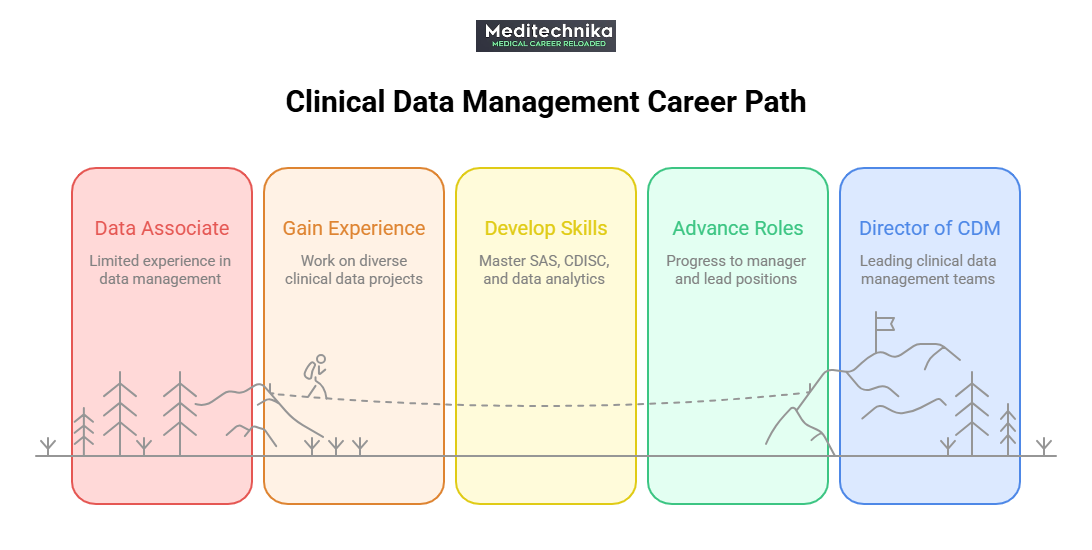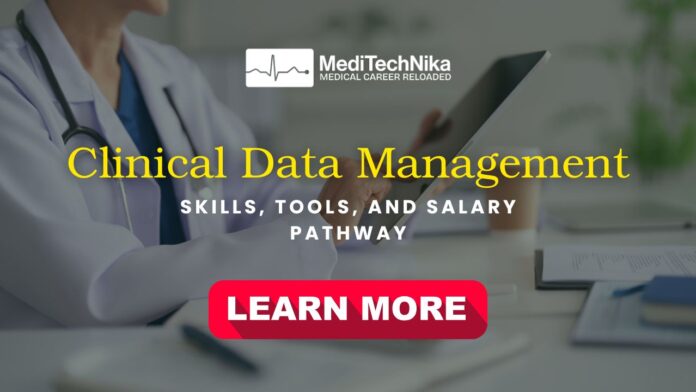Clinical Data Management Explained: Your Path from Healthcare to Data-Driven Roles
Clinical Data Management is becoming one of the most important careers for medical and life science professionals. As the healthcare world is advancing, the need for skilled professionals who can contribute meaningfully to the research organisations, pharma companies, and hospitals is also increasing.
If you are someone from a clinical or medical background and you are exploring the roles that can blend science, technology, and analysis, CDM is for you.
What is CDM?
Clinical Data Management is a process of collecting data, cleaning and managing clinical trial data to ensure its accuracy, reliability and if it is ready for analysis.
In simpler terms, CDM professionals are guardians of clinical research as they ensure all the data that is collected from clinical trials is of high quality, reliable and follows all regulatory standards.
Imagine a new cancer drug is being tested in thousands of hospitals worldwide. Each location collects patient data, lab results, and drug side effects. Now CDM professionals come into the picture. CDM professionals will make sure that the data is formatted properly, verified and then stored safely so that it can be used by the researchers for their final thoughts.
They ensure that the data is collected in a standardised format, verified, and stored safely so that the researchers can give accurate conclusions.
Why is CDM a Better Career For Healthcare Professionals?
Healthcare is evolving very quickly. With the rise of digital health and electronic data capture systems, and AI-powered analytics, the scope of clinical data roles is rapidly expanding.
Here is why it makes sense to many healthcare professionals:
- Transferable Skills: Your understanding of medical terminology, patient data, and clinical workflows directly translates into CDM.
- Tech Meets Healthcare: CDM lets you combine clinical knowledge with data-driven tools, making it ideal for those who enjoy structured, analytical work.
- Global Opportunities: CDM roles are in high demand worldwide, especially in pharmaceutical companies, CROs (Clinical Research Organizations), and regulatory agencies.
- Career Growth: You can advance from a Clinical Data Associate to a CDM Manager, Clinical Data Scientist, or even a Director of Data Operations.

The Main Skills Required to Enter Clinical Data Management
To be ahead of all others in CDM, first, you will need a mix of field language, analytical mindset, and technical skills. These are all the main skills that you can focus on:
Clinical and Medical Knowledge: Understanding clinical trials, patient data, and the study procedures is the first step. Your medical and healthcare background will help you start here.
Key areas:
- Clinical trial phases and GCP (Good Clinical Practice)
- Medical terminology and the drug development process
- Data privacy regulations (like HIPAA, GDPR)
Data Management and EDC Systems: The CDM professionals should have knowledge of electronic data capture and clinical trial management systems. These are the platforms where much clinical data exists.
Popular Tools:
- Medidata Rave
- Oracle Clinical / InForm
- REDCap
- Veeva Systems
- OpenClinica
The daily tasks include formatting case report forms, verifying data, and managing questions.
Analytical Thinking and Logical Thinking: A good attention to detail is required as you will be handling a lot of data and you need to spot errors that might affect the trial outcomes.
Technical Skills: Every CDM professional should have some technical knowledge, which will make them stand out. Knowledge of these tools will help you work faster and make faster decisions.
Useful Tools That You Can Use:
- Excel / SQL: This can be used for organising and obtaining data easily.
- Python / R: This is used for cleaning and making useful reports.
- SAS (Statistical Analysis System): This can be used for checking the quality of data and preparing statistical reports.
Soft Skills: Along with technical knowledge, soft skills are also important as you will work with clinical researchers, statisticians, and regulatory teams. So, time management, problem solving, teamwork and communication skills will help you.
Certifications That Can Help Your Career
- Certified Clinical Data Manager (CCDM®) – Offered by the Society for Clinical Data Management (SCDM).
- CDISC Certification
- Courses from Biotecnika, DIA, ICRI, and other institutions provide you with training in clinical research and data management.
Career Paths and Roles In CDM
| Level | Position | Experience Range | Core Responsibilities |
| Entry-Level | Clinical Data Coordinator / Associate | 0-2 years | Data entry and reviewing case report forms, managing data queries |
| Mid-Level | Lead / Clinical Data Manager | 3-6 years | To design databases and coordinate with teams |
| Senior-Level | Quality Lead / CDM Manager | 6-10 years | QC, training the team and ensuring the work process |
| Expert-Level | Data Management Head / Director | 10+ years | Planning strategies, and managing global data |

What Is The Salary You Can Expect In CDM
| Position | Average Annual Salary (India) | Global Salary Range (USD) |
| Clinical Data Associate | ₹4–6 LPA | $45,000–$65,000 |
| Clinical Data Manager | ₹7–12 LPA | $70,000–$90,000 |
| Lead / Senior Data Manager | ₹12–18 LPA | $90,000–$120,000 |
| Head / Director | ₹20 LPA+ | $130,000–$160,000+ |
Note: The above-mentioned salary can vary depending on the location and company.
How To Start A Career In Clinical Data Management?
- First, Understand The Field: Learn how the clinical trials work and how data moves from the collection step to the analysis step.
- Get Trained: Take up some courses and certifications in CDM.
- Learn The Tools: Gain hands-on experience with important tools. Certain tools are listed above.
- Develop Your Skills in Data: Strengthen your basic knowledge in Excel and SQL for managing and analyzing data.
- Apply Your Knowledge: Start with entry-level jobs and gain experience eventually.
What is the Future Of Clinical Data Management?
Clinical data management is a crucial part that directly affects medical advancement and patient safety.
CDM offers the ideal balance of clinical expertise, analytical challenges, and career growth opportunities for healthcare professionals looking for a dynamic, tech-driven, and globally relevant field.
Those with the ability to handle and comprehend data will be key players in the digital transformation of healthcare as medicine becomes more and more data-driven.
So, if you are someone who’s been wondering where your medical background can meet modern innovation, CDM is where it all begins.






